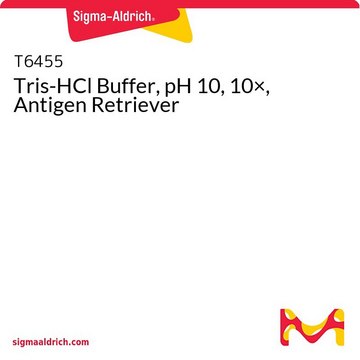RDD009
Trizma® hydrochloride
anhydrous, free-flowing, Redi-Dri™, ≥99.0%
Synonim(y):
TRIS HCl, TRIS hydrochloride, Tris(hydroxymethyl)aminomethane hydrochloride, Tromethane hydrochloride
About This Item
Polecane produkty
klasa czystości
anhydrous
linia produktu
Redi-Dri™
Próba
≥99.0%
Postać
powder
jakość
free-flowing
zanieczyszczenia
≤0.5% water (Karl Fischer)
kolor
white
przydatny zakres pH
7.0-9.0
pKa (25°C)
8.1
mp
150-152 °C
rozpuszczalność
H2O: soluble, clear, colorless
absorpcja
≤0.05 at 290 nm at 40%
ciąg SMILES
Cl.NC(CO)(CO)CO
InChI
1S/C4H11NO3.ClH/c5-4(1-6,2-7)3-8;/h6-8H,1-3,5H2;1H
Klucz InChI
QKNYBSVHEMOAJP-UHFFFAOYSA-N
Szukasz podobnych produktów? Odwiedź Przewodnik dotyczący porównywania produktów
Inne uwagi
Informacje prawne
Kod klasy składowania
11 - Combustible Solids
Klasa zagrożenia wodnego (WGK)
WGK 1
Temperatura zapłonu (°F)
Not applicable
Temperatura zapłonu (°C)
Not applicable
Certyfikaty analizy (CoA)
Poszukaj Certyfikaty analizy (CoA), wpisując numer partii/serii produktów. Numery serii i partii można znaleźć na etykiecie produktu po słowach „seria” lub „partia”.
Masz już ten produkt?
Dokumenty związane z niedawno zakupionymi produktami zostały zamieszczone w Bibliotece dokumentów.
Klienci oglądali również te produkty
Produkty
Redi-Dri™ zapobiega wchłanianiu wilgoci i tworzeniu się grudek przez higroskopijne proszki, takie jak sole nieorganiczne, pozostawiając za każdym razem sypkie sole.
Nasz zespół naukowców ma doświadczenie we wszystkich obszarach badań, w tym w naukach przyrodniczych, materiałoznawstwie, syntezie chemicznej, chromatografii, analityce i wielu innych dziedzinach.
Skontaktuj się z zespołem ds. pomocy technicznej


